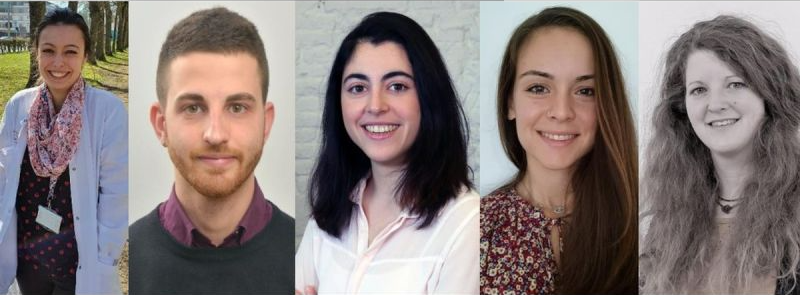Five PhD candidates awarded the 2021 Pélican Grant
-
Themenbereich
Health and Research -
Schwerpunkt
Forschung -
Region
Luxemburg -
Stiftung
Fondation du Pélican de Mie et Pierre Hippert-Faber

For the 2021 Pelican Grant edition, five international students were awarded (from left to right): Catherine Delbrouck and Andrea Scafidi from the Luxembourg Institute of Health (LIH), Elisa Gomez De Lope and Kyriaki Barmpa from the Luxembourg Centre for Systems of Biomedicine (LCSB), and Susanne Gonder from the LIH.
Each year, the Fondation du Pélican, under the aegis of Fondation de Luxembourg, awards a number of doctoral candidates affiliated with the systems and molecular biomedicine programme of the Doctoral School in Science and Engineering (DSSE) at the University of Luxembourg with the “Pelican Grant”. This grant may be used for research expenses, such as costs for additional experiments or travel expenses to participate in conferences and training workshops, as well as to finance short-term stays abroad in the context of research collaborations.
Congratulations to the 2021 grant recipients: Susanne Gonder, Elisa Gomez De Lope, Kyriaki Barmpa, Andrea Scafidi, and Catherine Delbrouck :
- Susanne Gonder (LIH)
Research topic: T lymphocytes, natural killer cells or dendritic cells in the development of immunotherapies and cancer vaccines, and specifically B lymphocytes and their dual role in the tumor microenvironment.
- Elisa Gomez De Lope (LCSB)
Research topic: The integrative development of machine learning (ML) methods applied to large-scare omics data and in this context, the use of statistics to predict early signs of PD and prognosis in later stages of the disease.
- Kyriaki Barmpa (LCSB)
Research topic: The development of a novel in vitro 3D aging model of the human brain for studying Parkinson’s disease (PD)
- Andrea Scafidi (LIH)
Research topic: Elucidate the mechanisms underlying the polarization of tumor-associated microglia/macrophages (TAMs) towards tumor-supportive cells and identify targets that may render them anti-tumorigenic.
- Catherine Delbrouck (LIH)
Research topic: Cellular metabolism and specifically the hypothesis that locally increased formate concentrations within the tumour microenvironment promote cancer cell escape and dissimination.
- Unterstützte Projekte
- Pélican Grant
